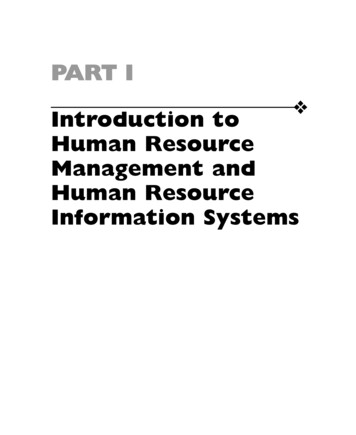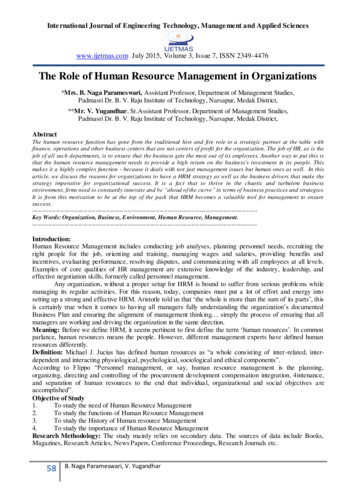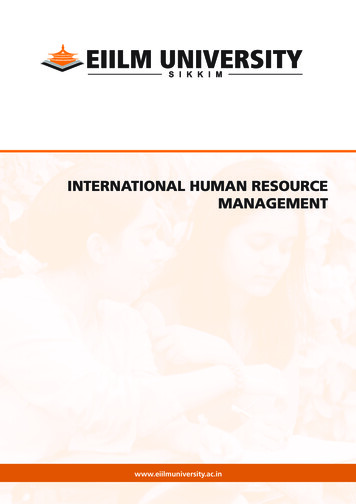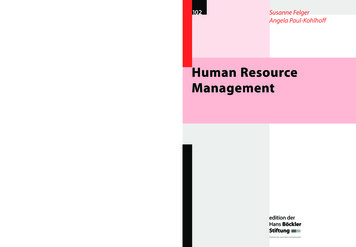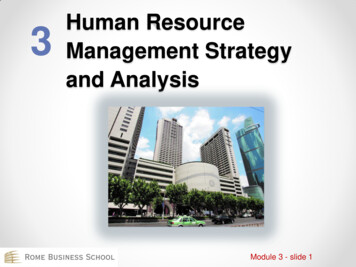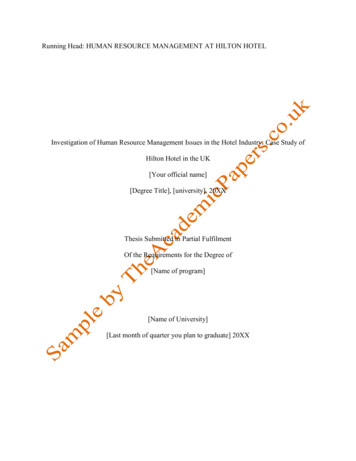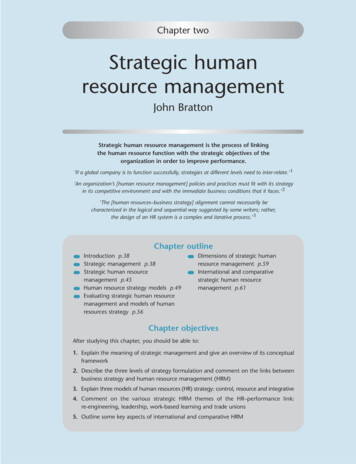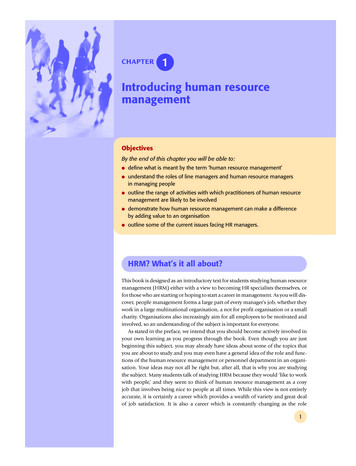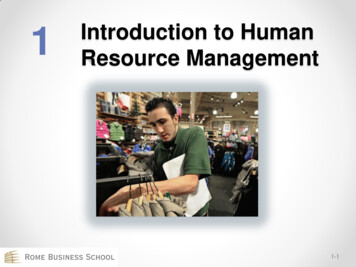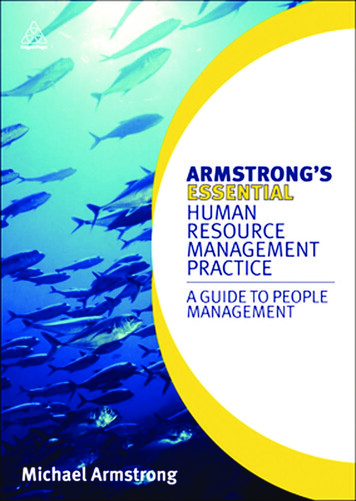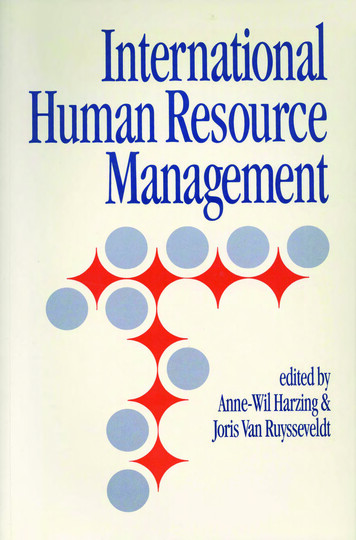
Transcription
3122-prelims.qxd10/29/03 2:20 PMPage iInternational HumanResource Management
3122-prelims.qxd10/29/03 2:20 PMPage ii
3122-prelims.qxd10/29/03 2:20 PMPage iiisecond editionInternational HumanResource Managementedited byA n n e - Wi l H a r z i n gJ o r i s Va n R u y s s e v e l d tSAGE PublicationsLondonlThousand OakslNew Delhi
3122-prelims.qxd10/29/03 2:20 PMPage iv Anne-Wil Harzing and Joris van Ruysseveldt, 2004First published 2004Apart from any fair dealing for the purposes of researchor private study, or criticism or review, as permittedunder the Copyright, Designs and Patents Act, 1988, thispublication may be reproduced, stored or transmittedin any form, or by any means, only with the priorpermission in writing of the publishers, or in the case ofreprographic reproduction, in accordance with the termsof licences issued by the Copyright Licensing Agency.Enquiries concerning reproduction outside those termsshould be sent to the publishers.SAGE Publications Ltd1 Olivers YardLondon EC1Y 1SPSAGE Publications Inc2455 Teller RoadThousand Oaks, California 91320SAGE Publications India Pvt LtdB-42, Panchsheel EnclavePost Box 4109New Delhi 100 017British Library Cataloguing in Publication dataA catalogue record for this book is availablefrom the British LibraryISBN 0 7619 4039 1ISBN 0 7619 4040 5 (pbk)Library of Congress Control Number availableTypeset by C&M Digitals (P) Ltd., Chennai, IndiaPrinted in Great Britain by The Cromwell Press Ltd, Trowbridge, Wiltshire
3122-prelims.qxd10/29/03 2:20 PMPage vContentsAcknowledgementsviiForeword by Nancy J. AdlerviiiContributor BiographiesAbbreviationsIntroductionPART 1INTERNATIONALIZATION: CONTEXT, STRATEGY,STRUCTURE AND PROCESSES1Internationalization and the international division of labourAnne-Wil Harzing2Strategy and structure of multinational companiesAnne-Wil Harzing3International human resource management: recent developmentsin theory and empirical researchHugh Scullion and Jaap Paauwe4Human resource management in cross-border mergers and acquisitionsGünter K. Stahl, Vladimir Pucik, Paul Evansand Mark E. MendenhallPart 2HRM FROM A COMPARATIVE PERSPECTIVExxvi1793365891155Cross-national differences in human resources and organizationArndt Sorge1176Culture in management: the measurement of differencesLaurence Romani1417HRM in EuropeChristine Communal and Chris Brewster1678HRM in East AsiaYing Zhu and Malcolm Warner195
3122-prelims.qxd10/29/03 2:20 PMviPage viContents9 HRM in developing countriesTerence JacksonPART 3MANAGING AN INTERNATIONAL STAFF22124910Composing an international staffAnne-Wil Harzing25111Training and development of international staffIbraiz Tarique and Paula Caligiuri28312International compensation and performance managementMarilyn Fenwick30713Repatriation and knowledge managementMila Lazarova and Paula Caligiuri33314Women’s role in international managementHilary Harris357PART 41516INDUSTRIAL RELATIONS: A COMPARATIVEAND INTERNATIONAL PERSPECTIVE387The transfer of employment practices across borders inmultinational companiesTony Edwards389Varieties of capitalism, national industrial relations systemsand transnational challengesRichard Hyman41117Industrial relations in Europe: a multi-level system in the making?Keith Sisson43318The Eurocompany and European works councilsPaul Marginson457Author Index482Subject Index490
3122-prelims.qxd10/29/03 2:20 PMPage viiAcknowledgementsSo much has changed since the 1st edition. We cannot even begin to encompassthe changes which have occurred in our now ‘globalized’ world. However, thenature of academic work has also changed considerably since the 1st edition ofthis book was published in 1995. Internet access and email have transformedour daily working lives. Internet access means having information at ourfingertips. However, it also means an increasing challenge in assessing therelevance of all this information. The contributors of this book have done anexcellent job in sifting the wheat from the chaff. The use of email has made itmuch easier to communicate with authors. While for the 1st edition, much ofour editorial work was done via fax or even personal meetings with the chapterauthors, the current edition was based on email contact alone (a lot of it!). Thishas made it possible to involve authors from a far wider range of countries thanbefore.Much has stayed the same as well. First, our philosophy that the book bedeveloped as a research-based textbook has remained constant. The bookreflects the characteristics of the transnational MNC in that we think it combines the benefits of knowledge transfer (authors who are experts in theirfield), integration (a coherent textbook) and local responsiveness (authors frommany different countries as well as chapters specific to Asia, Europe and Africa).What never changes is the fact that for such an undertaking many peopledeserve acknowledgements. First of all we would like to thank Arndt Sorge forencouraging us to embark on a 2nd edition. If he had not spoken so convincingly about our duty to the field, this 2nd edition may never have materialized.Second, we owe a big vote of thanks to our authors. Given the scale of the taskof coordinating the editing of 18 chapters from around the globe, Anne-Wilwould particularly like to acknowledge their wonderful responsiveness to therepeated requests for text revision. Their cooperation in working within thedeadlines made the job so much easier. Anne-Wil’s research assistant, SheilaGowans, performed her job as proofreader with a perfect blend of commitmentand conscientiousness.At Sage, Kiren Shoman was the first to believe in the book and convincedthe Sage board of the need for a 2nd edition. She was later joined by Keith VonTersch and together they made a perfect team. Seth Edwards then ensured thatthe book moved through the production process smoothly, while BenSherwood took care of the all important promotion of the book.Anne-Wil HarzingJoris Van Ruysseveldt
3122-prelims.qxd10/29/03 2:20 PMPage viiiForeword by Nancy J. Adler1Which is farther, the sun at sunrise or the sun at noon? The first sage argued,‘At sunrise, of course, the sun is closest when it is largest.’ The second sagevehemently disagreed, ‘No, at noon, of course! The sun is closest when it’swarmest.’ Unable to resolve the dilemma, the two sages turned toConfucius.com for help. Feeling the sun’s fading warmth as it lowered itselfinto a blazing sunset, Confucius remained silent.2Myth, misinformation, and silence have pervaded the field of internationalhuman resource management (HRM) since its inception.3 Understanding thedynamics of people in organizations has always been challenging. However,never prior to the twenty-first century has the intensity of globalization interacted so profoundly with organizations and the people who lead them andwork in them. To understand the challenges of twenty-first century organizational efficacy is to address the myriad of dilemmas facing people who constantly work outside their native country with people from wider and widerranges of the world’s cultures.Can we allow ourselves to continue to be guided by myth, misinformation,and silence? No. Do we, as scholars, researchers, and executives, know how toresolve the human dilemmas posed by extremely high levels of global interaction? No, not yet. Do we need to know? Yes. In International Human ResourceManagement, the editors have brought together an eminent group of scholarsfrom around the world to report on state-of-the-art international HRMresearch. Unlike Confucius, they have chosen not to remain silent in the faceof dilemmas that were heretofore unresolvable. They offer research results andrecommendations that can and should guide our scholarly and executiveappreciation of global diversity and its impact on human system functioning.The book includes macro strategic perspectives along with micro individual-level1Nancy J. Adler is a professor of international management at McGill University, Montreal,Canada.2Based on an ancient Chinese wisdom story as edited by Nancy J. Adler and Lew Yung-Chienwhile artists in residence at the Banff Centre for the Arts, 2002.3For an in-depth discussion of the patterns of myths and errors undermining the field, seeA.W.K. Harzing’s ‘The Role of Culture in Entry Mode Studies: From Negligence to Myopia?’ inAdvances in International Management, Vol. 15, 2003, pp. 75–127; A.W.K. Harzing’s ‘Are OurReferencing Errors Undermining our Scholarship and Credibility? The Case of ExpatriateFailure Rates,’ Journal of Organizational Behavior, Vol. 23, February, 2002, pp. 127–148; andA.W.K Harzing’s ‘The Persistent Myth of High Expatriate Failure Rates,’ The InternationalJournal of Human Resource Management, May 1995, pp. 457–475.
3122-prelims.qxd10/29/03 2:20 PMPage ixForewordixperspectives. It encompasses perspectives from Asia, Europe, and the Americas.It takes in the point-of-view of management and labour. Whereas neither thisbook nor any book can answer all our questions about people working globally,International Human Resource Management goes a long way in separating mythand misinformation from research-based fact. It fills some of the field’s silencewith perceptive dialogue. It is a book well worth reading.
3122-prelims.qxd10/29/03 2:20 PMPage xContributor BiographiesChris BrewsterProfessor of International Human Resource Management at HenleyManagement College, UK. He had substantial experience in trade unions,Government, specialist journals, personnel management in construction andair transport, and consultancy, before becoming an academic. Chris has consulted and taught on management programmes throughout the world and is afrequent international conference speaker. He has conducted extensiveresearch in the field of international and comparative HRM; written somedozen books and over a hundred articles. In 2002 Chris Brewster was awardedthe Georges Petitpas Memorial Award by the practitioner body, the WorldFederation of Personnel Management Associations, in recognition of his outstanding contribution to international human resource management.Paula CaligiuriDirector of the Center for Human Resource Strategy and an Associate Professorof Human Resource Management at Rutgers University in the United States.She researches, publishes, and consults in the area of international humanresource management – specifically on the topics of expatriate management,women on global assignments, and global leadership. Her research on these topics has appeared in numerous journals and edited books. Dr Caligiuri is on theeditorial boards of Career Development International, Journal of OrganizationalBehavior, Human Resources Planning Journal, and International Journal of HumanResource Management and is an Associate Editor for Human Resource ManagementJournal.Christine CommunalLecturer in International Management, Cranfield University, School ofManagement, UK. Christine has the ability to enthuse people with her passionfor supporting individuals and organizations in the process of internationalization. She has developed a unique approach to personal, managerial andorganizational development, with a strong focus on intercultural awareness.Her early work experience was in France and Germany and encompassed various industry sectors (petro-chemicals, mobile telephony and electricity distribution). She then moved to the UK to complete a Doctorate examining theimpact of national culture on managerial behaviour. Christine built on herdoctoral specialization to become the youngest Faculty member at CranfieldSchool of Management, teaching on the MBA, Doctorate and Executiveprogrammes.
3122-prelims.qxd10/29/03 2:20 PMPage xiContributor BiographiesxiTony EdwardsLecturer in Comparative Management at King’s College, London. His research isin the area of employment relations in MNCs. One of the themes of this researchis the diffusion of employment practices across borders within MNCs, with a specific focus on the process of ‘reverse diffusion’ in which practices are diffused fromforeign subsidiaries back to the domestic operations of MNCs. Currently he isworking on two projects, one of which is concerned with the ‘country of origin’effect in American MNCs in the UK, while the other is concerned with the management of employment relations following a cross-border merger or acquisition.Paul EvansThe Shell Chaired Professor of Human Resources and OrganizationalDevelopment and Professor of Organizational Behaviour at INSEAD, where hehas led INSEAD’s activities in the field of human resource and organizationalmanagement since the early 1980s. He is co-author of Must Success Cost SoMuch?, a pioneering study on the professional and private lives of executives;Human Resource Management in International Firms: Change, Globalization,Innovation, and The Global Challenge: Frameworks for International HumanResource Management. He has a degree in law from Cambridge University, anINSEAD MBA, a Danish business diploma, and his PhD is from MIT.Marilyn FenwickSenior Lecturer in the Department of Management at Monash University. She wasawarded her PhD on expatriate performance management by the University ofMelbourne. She has published journal articles and book chapters in the areas ofinternational human resource management and international management.Marilyn convenes a special interest group in International HRM for the AustralianHuman Resources Institute in Victoria. Her research interests concern: nonstandard and virtual international assignments; human resources developmentand performance management in multinationals; strategic HRM in internationalinter-organizational networks and international non-profit organizations.Hilary HarrisDirector of the Centre for Research into the Management of Expatriation(CREME) at Cranfield School of Management. Dr Harris has had extensiveexperience as an HR practitioner and has undertaken consultancy with a broadrange of organizations in the public and private sectors. Her specialist areas ofinterest are International HRM, expatriate management, cross-cultural management and women in management. She teaches, consults and writes extensively in these areas. Hilary was one of the lead researchers on the CIPDflagship research programme looking at the impact of globalization on the roleof the HR professional.Anne-Wil HarzingAssociate Professor in the Department of Management at the University ofMelbourne. Her work on HQ-subsidiary relationships, staffing policies and
3122-prelims.qxdxii10/29/03 2:20 PMPage xiiContributor Biographiesinternational management has been published in journals such as Journal ofInternational Business Studies, Strategic Management Journal, Journal of Organizational Behavior and Organization Studies. She also published Managing theMultinationals (Edward Elgar, 1999). Her current research interests include therole of language in international business, the transfer of HRM practices acrossborders, the interaction between language and culture in internationalresearch, expatriates and knowledge transfer, and HQ-subsidiary relationships.Richard HymanProfessor of Industrial Relations at the London School of Economics andPolitical Science (LSE) and is founding editor of the European Journal ofIndustrial Relations. He has written extensively on the themes of industrial relations, collective bargaining, trade unionism, industrial conflict and labour market policy, and is author of a dozen books as well as numerous journal articlesand book chapters. His most recent book, Understanding European TradeUnionism: Between Market, Class and Society, was published by Sage in 2001 andis already widely cited by scholars working in this field.Terence JacksonHolds a bachelors degree in Social Anthropology, a masters in Education, anda PhD in Management Psychology. He is Director of the Centre for CrossCultural Management Research at ESCP-EAP European School of Management(Oxford-Paris-Berlin-Madrid). He edits, with Dr Zeynep Aycan, the InternationalJournal of Cross Cultural Management (Sage Publications) and has recently published his sixth book International HRM: A Cross Cultural Approach. He has published numerous articles on cross-cultural management ethics, managementlearning and management in developing countries in such journals as HumanResource Management, Human Relations, Journal of Management Studies, and AsianPacific Journal of Management. He is currently directing a major research projecton Management and Change in Sub-Saharan Africa.Mila LazarovaRecently joined the International Management Department of the Faculty ofBusiness Administration at Simon Fraser University in Canada. Mila’s primaryresearch interests are in the area of international human resource managementand, more specifically, management of global assignees. Her recent research hasbeen focused on issues related to retention upon repatriation and the changingnotions of international careers. She has also done research on other relatedtopics such as cross-cultural adjustment and the expatriate experience offemale assignees. Mila has published in the Journal of International HumanResource Management and the Journal of World Business and her work has beenpresented at conferences in North America and Europe.Paul MarginsonProfessor of Industrial Relations and Director of the Industrial RelationsResearch Unit at Warwick Business School, University of Warwick. He has
3122-prelims.qxd10/29/03 2:20 PMPage xiiiContributor Biographiesxiiiresearched and published extensively on the management of employmentrelations in MNCs and on the Europeanization of industrial relations. Major recentprojects include studies of the agreements establishing, and the practice andimpact of, European Works Councils; the industrial relations implications ofEconomic and Monetary Union; and European dimensions to sector and company collective bargaining. A book with Keith Sisson – European Integration andIndustrial Relations: Multi-level Governance in the Making – is due to be publishedby Palgrave-Macmillan in 2004.Mark E. MendenhallHolds the J. Burton Frierson Chair of Excellence in Business Leadership at theUniversity of Tennessee, Chattanooga. He is past president of the InternationalDivision of the Academy of Management, and has authored numerous journal articles in international human resource management. His most recent book is DevelopingGlobal Business Leaders: Policies, Processes, and Innovations (Quorum Books).Jaap Paauwe(PhD, Erasmus University) is Professor of Business and Organization at theRotterdam School of Economics, Erasmus University Rotterdam. He has written and co-authored eleven books on human resource management and published numerous papers on HRM, industrial relations and organizationalchange. Twice (1997 and 2001) he was in charge of the editing of a special issueon HRM and Performance for the International Journal of HRM. He is researchfellow and coordinator for the research programme on ‘Organizing forPerformance’ of the Erasmus Research Institute for Management (ERIM). Fieldsof interest include human resource management, industrial relations, organizational change, new organizational forms and corporate strategy.Vladimir PucikProfessor of International Human Resources and Strategy at IMD, Lausanne,Switzerland. Born in Prague, he received his PhD in business administrationfrom Columbia University in New York and previously taught at CornellUniversity and the University of Michigan. He also spent three years as a visiting scholar at Keio and Hitotsubashi University in Tokyo. Dr Pucik teaches regularly on executive development programmes in Europe, the US and Asia, andhas consulted and conducted workshops for major corporations worldwide. Hismajor works include The Global Challenge: Frameworks for International HRM,Accelerating International Growth and Globalizing Management: Creating and Leadingthe Competitive Organization.Laurence RomaniResearch Associate at the Institute of International Business (IIB) of theStockholm School of Economics (Sweden). She studied social anthropologyand sociology at the Sorbonne in Paris. Her research interests are in the field ofcross-cultural management. She is currently preparing her dissertation, whichfocuses on quantitative studies of culture and management. She addresses their
3122-prelims.qxd10/29/03 2:20 PMPage xivxiv C o n t r i b u t o r B i o g r a p h i e sissues and limitations with the endeavour of improving the current theoreticalmodels. Her research is inspired by an interpretative approach.Hugh ScullionProfessor of International HRM at Strathclyde University. He previously workedat Nottingham and Warwick Business Schools. Hugh is a Visiting Professor atthe Business Schools of Toulouse and Grenoble and also at Limerick University.He consults with leading international firms such as Rolls Royce and Bank ofIreland. Hugh researches on international strategy and international HRM inEuropean multinationals and has developed a strong network of HR directorsin Europe. He has written several books and over fifty specialist articles inInternational HRM. Hugh’s latest books are International HRM: A Critical Text(Palgrave, 2004) and Global Staff ing (Routledge, 2004).Keith SissonHead of Strategy Development at the UK’s Advisory, Conciliation andArbitration Service and Emeritus Professor of Industrial Relations in theWarwick Business School’s Industrial Relations Research Unit (IRRU), havingpreviously been its Director. In recent years, he has been extensively involvedin cross-national comparative research involving projects funded by the UK’sEconomic and Science Research Council and the European Foundation for theImprovement of Living and Working Conditions, including those on the roleof direct participation in organizational change, the impact of EMU and thehandling of restructuring. A book with Paul Marginson summarising many ofthe results of this work (European Integration and Industrial Relations: Multi-levelGovernance in the Making) is due to be published by Palgrave in 2004.Günter K. StahlAssistant Professor of Asian Business and Comparative Management at INSEAD.Prior to joining INSEAD, he was Assistant Professor of Leadership and HumanResource Management at the University of Bayreuth, Germany. He also held visiting positions at the Fuqua School of Business and the Wharton School of theUniversity of Pennsylvania. Günter has (co-) authored several books as well asnumerous journal articles in the areas of leadership and leadership development,cross-cultural management, and international human resource management. Hiscurrent research interests also include international careers, trust within andbetween organizations, and the management of mergers and acquisitions.Arndt SorgeProfessor of Organization Studies at the Faculty of Management andOrganization, University of Groningen, The Netherlands. He has mainlyworked in international comparisons of work, organization, human resources,technical change and industrial relations. This has implied uninterrupted expatriation through a succession of positions at several universities and researchinstitutes in Germany, his native country, The Netherlands, Britain and France.Next to writing more specialist publications, based on field research in three
3122-prelims.qxd10/29/03 2:20 PMPage xvContributor Biographiesxvdifferent societal contexts, he has also edited standard Organization volumesin the series of the International Encyclopedia of Management and Organization,most recently Organization (London: Thomson Learning, 2002), and he wasformerly editor-in-chief of Organization Studies.Ibraiz TariquePhD Candidate at the School of Management and Labor Relations, RutgersUniversity, New Jersey, USA. His research interests include human resourcemanagement issues in cross-border alliances and training and developmentissues in transnational enterprises. His teaching interests include strategichuman resource management, international human resource management,and developing human capital. His research has been presented at the AnnualAcademy of Management Meetings and at the Society of Industrial andOrganizational Psychologist Conferences and has been published in theInternational Journal of Human Resource Management.Joris Van RuysseveldtAssociate Professor at the Open University of The Netherlands. He studiedSociology at The Catholic University of Leuven. His dissertation (2000) focusedon collective bargaining structures in Belgium and The Netherlands. As researchmanager at the Higher Institute of Labour Studies (University of Leuven), heconducted research on topics like quality of working life, European workscouncils, organizational learning and teamwork. He presently develops coursesin the field of human resource management. He has published articles andbooks on industrial relations in Europe, comparative employment relations,quality of working life and sociology of work.Malcolm WarnerProfessor and Fellow, Wolfson College and Judge Institute of Management,University of Cambridge. He is the Editor of the International Encyclopedia of Businessand Management (London: Thomson, 6 volumes, 1996; second edition, 8 volumes,2002) and Co-Editor of the Asia-Pacific Business Review. Professor Warner has writtenand edited over 25 books and over 200 articles on management. His most recentbook, Culture and Management in Asia, is published by Routledge Curzon, 2003.Ying ZhuSenior Lecturer in the Department of Management, the University ofMelbourne. He graduated from International Economics Department at PekingUniversity and worked as an economist in the Shenzhen Special EconomicZone in China. He completed his PhD at The University of Melbourne in 1992.He was invited to be a visiting scholar at International Labour Organization inGeneva in 1997. His research interests are international human resource management, industrial development and employment relations in East Asia,including China, Japan, Korea, Taiwan and Vietnam. He has published a number of books and journal articles covering Asian economies, labour, industryand human resource management.
3122-prelims.qxd10/29/03 2:20 PMPage sKMTLDCsLEsM&AMNCsMOLNAFTAOJTPCNPRCQCCAsia Pacific Economic CooperationChinese Culture ConnectionChinese Communist PartyCross-Cultural TrainingCentral and Eastern EuropeChinese Federation of Labour (Taiwan)Collective-owned EnterprisesCountry-specific AdvantagesDomestic Private EnterprisesEuropean Central BankEuropean Economic AreaEuropean Economic CommunityEconomic and Monetary UnionEuropean Trade Union ConfederationEuropean UnionEuropean Works CouncilForeign Direct InvestmentForeign-owned EnterprisesFirm-specific AdvantagesHost Country NationalHeadquartersHuman ResourcesHuman Resource DevelopmentHuman Resource ManagementInternational Human Resource ManagementIndustrial RelationsJoint VenturesKumintang (Nationalist Party in Taiwan)Less Developed CountriesLarge-sized EnterprisesMergers and AcquisitionsMultinational CorporationsMinistry of Labour (Japan)North American Free Trade Agreementon the job trainingParent Country NationalPeople’s Republic of ChinaQuality Control Circles
3122-prelims.qxd10/29/03 2:20 PMPage TOStrategic Human Resource ManagementStrategic International Human Resource ManagementSmall- and Medium-sized EnterprisesState-owned EnterprisesThird Country NationalTotal Quality ManagementUnion of Industrial and Employers’ Confederations of EuropeVietnam Federation of Trade UnionsWorld Trade Organizationxvii
3122-prelims.qxd10/29/03 2:20 PMPage xviii
Introduction.qxd10/29/03 2:33 PMPage 1IntroductionWHAT MAKES THIS BOOK DIFFERENT?This book provides a comprehensive, research-based, integrated and internationalperspective of the consequences of internationalization for the management ofpeople across borders. The book’s comprehensiveness is evidenced by its widecoverage. Although we will pay due attention to expatriate management in thisbook, we will also look at the role of HRM in internationalization, the linkbetween strategy, structure and HRM in multinational companies (MNCs) andthe role of HRM in mergers and acquisitions. In addition, a discussion ofcomparative HRM, which focuses on the extent to which HRM differs betweencountries and the underlying reasons for these differences, will form a majorpart of this book. Finally, the book offers a detailed treatment of the collectiveaspects of the employment relation by looking at industrial relations from aninternational and comparative perspective.A second distinctive feature of this book is its solid research base. All chaptershave been specifically commissioned for this book and all authors are expertsand active researchers in their respective fields. Rather than having a finalchapter with ‘recent developments and challenges in IHRM’, we have given allauthors the clear brief to supplement classic theories and models with cuttingedge research and developments. The chapter on cross-cultural training forinstance includes a discussion on recent development in electronic CCT and inmany chapters over two thirds of the references are less than five years old.Although the book consists of 18 chapters written by a total of 23 authors,it has been very carefully edited to provide an integrated perspective. Eventhough the book is research-based, it is not a disparate collection of researchessays. All chapters are part of a carefully constructed framework and togetherprovide a coherent picture of the field of International HRM.A fourth and final distinctive characteristic of this book is that it is trulyinternational, both in its outlook and in its author base. Authors use examples
Introduction.qxd10/29/03 2:33 PM2Page 2International Human Resource Managementfrom all over the world and their research
Behavior, Human Resources Planning Journal, and International Journal of Human Resource Management and is an Associate Editor for Human Resource Management Journal. Christine Communal Lecturer in International Management, Cranfield University, School of Management, UK. Chr
